Clarkston, a small town in Georgia, has received over 40,000 refugees over the past 25 years. They come from every corner of the globe. This year there are more Congolese than Syrians; past waves of refugee resettlement have brought Bhutanese, Eritreans, Ethiopians, Somalis, Sudanese, Liberians, Vietnamese.
All have landed in an otherwise unremarkable city in the Deep South, population 13,000.
Look beyond the 1970s strip malls, apartment complexes and parking lots, and there are sights rarely seen elsewhere in America. Beige storefronts are topped by signs in Amharic and Nepali scripts, with evocative English translations: Balageru Food Mart, African Cultural and Injera Grocers, Numsok Oriental Grocers. Women gather nearby wearing bright African headscarves, and others cross the street in traditional Asian silk dresses, long black hair braided down their backs.
But foreigners are not the only migrants to Clarkston. The self-proclaimed “Ellis Island of the south” is now seeing not only refugees and poor immigrants arrive. Its reputation has prompted a swell of middle-class professional Americans, who – in the words of the city’s 34-year-old mayor, Ted Terry – are “in search of all the trappings of diversity”.
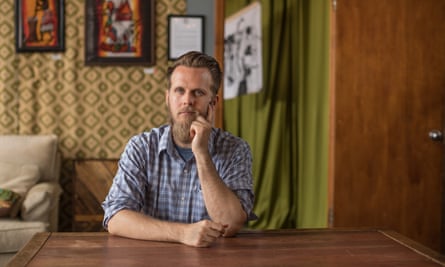
Terry, who has a hipster beard, checked shirt and odd socks, was welcoming a delegation from the Middle East, who had come to see how Clarkston manages its diverse refugee community.
“My goal with Clarkston is to showcase it,” he explained. “I didn’t make this place a compassionate community – yes, we enshrined it in an official way, but it was a compassionate and welcoming community long before I got here.”
How does this happen? How does a dusty, working-class city in the south not only manage to house 1,500 refugees per year, but make their welcome integral to the town’s sense of identity?
It turns out the story of Clarkston is not just about who is being welcomed: it’s also a story about who is doing the welcoming.
In the corner of Clarkston’s downtown parking lot is a bright red food truck selling artisanal coffee, the kind of sleek minimalist outfit that would not look out of place in San Francisco or New York, under the logo reading “Refuge Coffee”. It was founded by a recent American arrival.
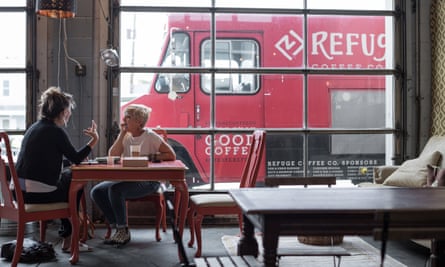
Kitti Murray, a freelance writer and grandmother of eight, bought the old truck on Craigslist for $3,000 two years ago, and began renting space on an old garage forecourt for a dollar a month, where she set up tables and chairs. Her aim was to create a space for the community to connect, offer job training, and “tell a more beautiful, more accurate refugee story … our refugee employees do that for us, just by who they are and how they do their work.”
As she talks, Ahmad – a Syrian who used to be a pharmacist before he became a barista – pours an espresso.
Murray’s clientele is conspicuously white. “When we first started, I would be grief-stricken if at the end of the day not a single refugee had come,” she said. “But if we don’t engage the American community, who have deep pockets … we would have been over in that first six months.”
Murray is not an outlier. She is just one of many Americans who have moved to Clarkston specifically to work with refugees and – crucially – to live alongside them. Welcoming refugees can involve long hours spent in newcomers’ homes, awkwardly tripping over language barriers while drinking tea, but the bonds forged are often strong ones.
Arez, a Syrian refugee who arrived with her husband and two children in 2015 after four years in Turkey, bubbles with enthusiasm as she talks about her American “sister” Rebecca who helped her to settle in Clarkston: “I love the US! I am so happy here. I have American friends, they are helping me to learn English, my kids are in school. I love it here.”

Brian Bollinger, the executive director of Friends of Refugees, a local organization that provides a number of refugee services, says that for both refugees and Americans coming to Clarkston “regaining a sense of place is a massive part of what this is all about”. But over naan and curry at the Kathmandu Café, he is also prosaic about the town’s embrace of refugees. “It would be utopian to suggest that was the original driver,” he says. “In the end, that was economics.”
What made Clarkston work for refugees, Bollinger says, are the opportunities afforded by its high-density apartment complexes and good transport links. It’s easy to catch a vanpool to the chicken factories one hour north, where many of the refugees first find low-wage employment. This was why Clarkston was identified in the early 1990s as a good resettlement hub, and now these same attractions – low-cost housing and proximity to the interstate – are part of what’s helping to attract young American professionals priced out of Atlanta.
Many Clarkston residents point out the town was not always so hospitable to refugees: their arrival was initially resented by many locals. But older opponents of refugees have moved on or passed away, and have been replaced by younger liberals. Bollinger calls Mayor Terry, who was elected in 2013 at the age of 31, “the physical embodiment of that change of perspective”.
Those older locals who have remained seem content to live in parallel with their refugee neighbors. Betty Cardell, 93, who has lived in Clarkston since she arrived as a war bride from California in 1950, is philosophical: “Well, they’re here. So what you going to do? They’re people like we are. I’ve never had trouble.” She has no interest in leaving. “I like Clarkston: it’s still a small town.”
This small-town feel is both part of the reason Clarkston works – and a limiting factor. For refugees, Clarkston is a starter city. Success means moving on, leaving its apartment complexes behind.
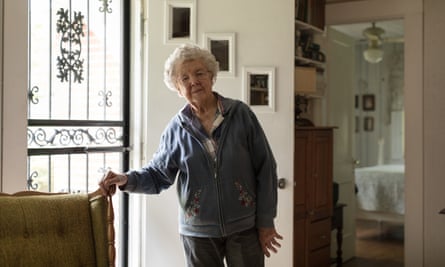
Heval Mohamed Kelli, who arrived in the US as a Syrian refugee three weeks after 9/11, having first spent six years in Germany, is an example of that transition: he relocated to the wealthy city of Lilburn, about 10 miles away.
Kelli is now a cardiologist. He began his journey to a version of the American dream – an elegant detached house, its manicured lawn sloping down to a lake – washing dishes while living in Clarkston. On this sweaty Saturday afternoon, Kelli is hosting a barbecue “to celebrate life” with friends old and new: Syrian, Iraqi, Kurdish, Sudanese – and American.
Kelli is emphatic in describing the welcome he received there, especially compared to the lack of warmth he encountered in Germany. “Two days after we arrived in Clarkston, we were terrified. And then all these people arrived at our door with food, wanting to help us learn English.” He laughs: “You know, we thought they were the CIA or something, all these white Americans knocking at our door.” In fact, they were members of Clarkston’s All Saints Episcopal Church: “They didn’t look at all like us. But they changed our lives.”
Kelli clearly feels an enormous debt of gratitude to those who helped him. He regularly returns to Clarkston, volunteering in the health clinic and mentoring students. His barbecue is a reminder that if Clarkston works as a community, it’s because of the refugees’ own hospitality.
There are countless stories of refugees spending their food stamps on gifts for their American neighbors, thanking them for small acts of kindness. Heidi Miller, a Tennessee native and the community liaison officer at Embrace, a program that provides refugee mothers with pregnancy and birth support, laughs when asked about the generosity of refugees. “Oh yes! I always tell people, you think you’ve experienced hospitality when you’ve come to the south … and then you go into a refugee’s home!”
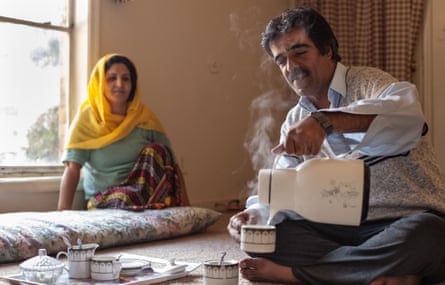
Clarkston is certainly no paradise. Just outside the city are dilapidated, burned-out apartment blocks that are virtually uninhabitable. The town lacks the power to condemn them, and in a city where the poverty rate is more than 40%, the prospect of cheaper rent can win out over fears of rat infestation and crime.
There’s hostility beyond the city limits too. Georgia’s governor, Nathan Deal, attempted to issue an executive order banning Syrian refugees in 2015, a full 15 months before Trump tried to do the same.
Yet Clarkston also benefits from wider networks of solidarity. Since Trump announced his travel ban in January, Friends of Refugees have seen a 400% increase in the number of volunteer applications. They now have several hundred weekly or bi-weekly volunteers, twice the number in years past.
Some are skeptical about how long this wider fashion for refugee advocacy will last. They wonder whether Clarkston has simply become a convenient vessel into which Atlanta’s woke liberals can pour their current discontents, claiming a fleeting commitment to social justice while enjoying artisanal coffee. But others hope this is not just a moment, but the beginning of a movement.
In Georgia, Clarkston has a reputation as a liberal bubble. Yet the reality on the ground is more complicated and unexpected. Refugees and their American neighbors seem to have found a sense of belonging here. That is something many Americans are searching for in an increasingly polarized, fragmented and angry world.
“In Clarkston there’s a lot of ethnic groups that were at odds with each other before, and are now neighbors,” Miller said. “You watch them learn how to love each other. I think refugees have a lot to teach Americans about forgiveness.”
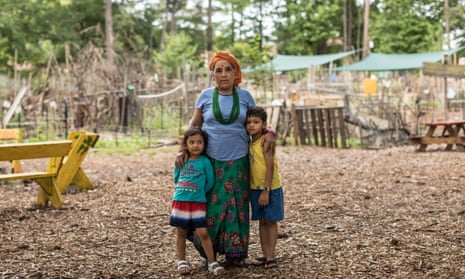
Comments (…)
Sign in or create your Guardian account to join the discussion